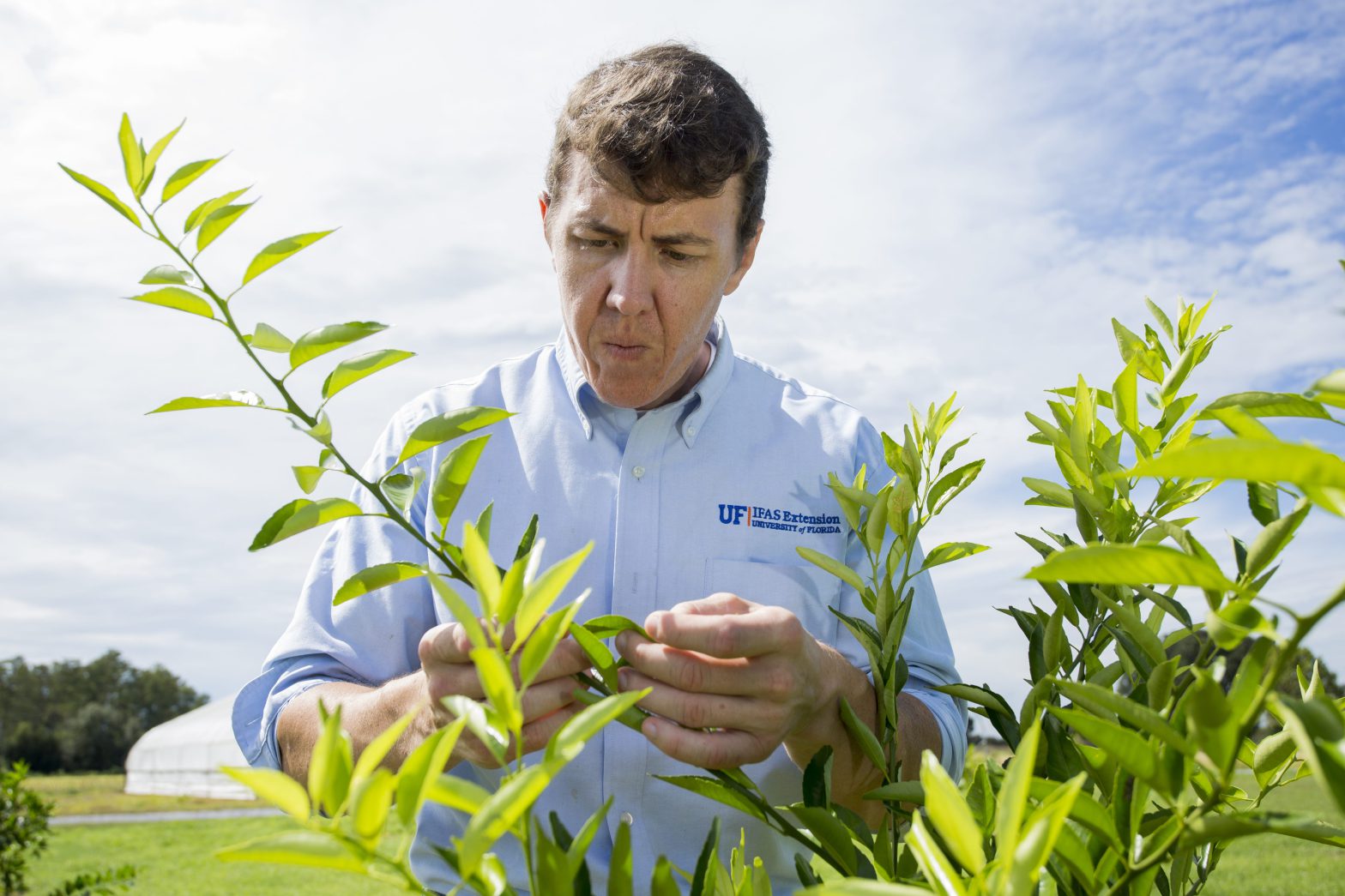![Matt Lollar of the University of Florida’s Institute of Food and Agricultural Sciences inspects a plant. [TYLER JONES | UF/IFAS]](http://127.0.0.1/wordpress/wp-content/uploads/2022/01/ghows-DA-7dc97a2d-528f-0a29-e053-0100007f42e5-736a55af-scaled.jpeg)
JAY — There’s a humble copse of 18 trees that recently got planted at an agricultural research station in Jay. It’s an experiment into whether Florida’s iconic crop can migrate up to the Panhandle.
It’s also the result of an agricultural agent’s migration, from a suburb where farming was losing a battle against urban encroachment to a place where he believes production agriculture has a better chance of long-term viability. And a place that he calls home.
Citrus just isn’t grown that much in North Florida. In fact, it’s also grown less and less in its traditional strongholds in central and south Florida as a deadly disease takes its toll on groves.
But just by planting the trees, Matt Lollar of the University of Florida’s Institute of Food and Agricultural Sciences is looking at least five years into the future – the time it will take for the trees to bear fruit.
And he’s asking questions: Will citrus be a thing in the Panhandle in the future? Can these new breeds stand up to the colder temperatures and different soils of the area?
It’s not the only crop he’s asking questions about. Lollar has his hand in peaches, olives, and even kiwis. Western Florida farms have succeeded on cotton, peanuts, and cattle. But this is farming, and things can go wrong.
Lollar, the UF/IFAS Santa Rosa County Extension agent, wants his growers to have options.
Communicating those options and encouraging the diversification of farms is how Lollar hopes to prevent growers from choosing an irrevocable option: Cashing out to developers who will pave the Panhandle’s fields of green.
Lollar saw it happen in Seminole County, where he started his career, bought a home and had citrus industry people as his neighbors. But he could see the urbanizing wave wash over his community, and he looked for a place where agriculture had a fighting chance. In other words, the kind of place he grew up.
He’s come as close as he can to that place without actually leaving Florida. Lollar was raised in Alabama and went to Auburn. His folks still live there, not even an hour’s drive from his office in Milton.
Lollar brought with him to Milton a record of service and relationships in the industry that make him an invaluable asset to anyone who makes their living off dirt.
The mandarin trees Lollar planted in Jay come from Peter Chaires, who lived down the street from him in Seminole County and is the executive director of the New Varieties Development and Management Corporation. When Chaires had some unsold trees, he bought them and gave them to Lollar.
These aren’t just any trees. Chaires traffics in the very latest varieties, some of which haven’t even been field-tested on a large scale. UF/IFAS breeders are most focused on creating disease-tolerant varieties. What Lollar is hoping is that one of the three varieties he has planted is Panhandle-tolerant.
It’s risky. As Mark Twain is credited with saying, "Farming is simply gambling with dirt." Extension agents like Lollar are trying to pick trees that are worth gambling on.
A grower can’t afford to roll the dice on much of his or her acreage without some demonstration that it has a chance of working. Lollar’s little clump of mandarins might offer that ray of hope. Or, it could be the warning that saves growers from discovering at their own cost that these aren’t the trees that will change Panhandle agriculture.
Either way, Lollar is settling in to his new role as county’s go-to agent for all fruit and vegetable crops. He’s working on growers’ problems today – from identifying what pest that is on a corn stalk to whether you’re overirrigating your yard.
At the same time, it’s his job to look to the future, to not just solve farmers’ problems but anticipate them. Looking to the future gives you a better chance to adapt what you treasure from your past. In Lollar’s case that means figuring out what grows in Santa Rosa and what will grow.
Jack Payne is the University of Florida’s senior vice president for agriculture and natural resources and leader of the Institute of Food and Agricultural Sciences.

This article originally appeared on Crestview News Bulletin: The Panhandle may be the next citrus-growing region
